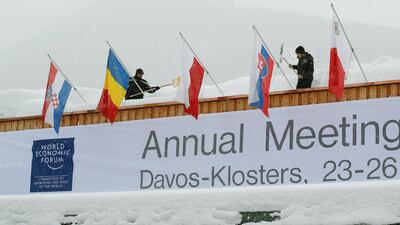There is a marked difference in Davos this year, compared with last year’s meeting. Concerns over the speed of technological change, the impact on work and society and the rise of populist politics are now considered part of modern life – and the World Economic Forum is embracing it. Disruption is no longer considered a threat.
And so, this year’s meeting has a ‘science hub’ and entire sessions dedicated to technological change and its impact. A mix of new technologies and economic growth has created a general sense of optimism that had been missing from the last two years at Davos.
Now that drones, Artificial Intelligence, cryptocurrencies and robots are part of our present and no longer spoken about as future technologies, they are greatly present at the Annual Meeting. No one can question the science on display. AI has already impacted sectors including health and services.
Professor Regina Barzilay from MIT explained that 96 per cent of breast cancer cases detected by AI in one of her trials were accurate. And yet greater issues remain. For example, who controls data from patients used to build up AI experience and how is it used? What happens if this data is used for decision-making that is not in the best interest of the patient, such as cost-cutting?
The issues of regulations, governance and control are at the heart of discussions between government officials, company executives, activists and academics this week. Laws and regulations around data, drones and AI are being legislated and adopted in a few countries and often influenced by those who this week are in Davos. And thus this year the general mood regarding technological disruption is positive, with opportunities for business deals and government innovation.
More immediately, positive economic forecasts have added energy to the Annual Meeting. The first full day of activity in Davos kicked off on the heels of the International Monetary Fund (IMF) announcing that global growth is getting stronger. Managing Director of the IMF Christine Lagarde, one of seven co-chairs of the Annual Meeting, announced that the global economy is witnessing ‘accelerated growth’ and that the trajectory for the next two years is positive.
Former secretary general of the Arab League Amre Mousa, a veteran Davos attendee, said: "this year feels more positive, people are here with energy and looking for new opportunities". One participant from the logistics sector said "the markets are picking up, the IMF is positive and people are generally buoyant".
Issues like the refugee crisis, inequality, climate change and the challenge of conflicts over resources are present on the agenda, which informed Ms Lagarde’s warning that risks remain and need new approaches to tackle them. Part of the embracing of disruption at Davos is aimed at meeting that challenge.
_______________
Read more on Davos:
Davos 2018 diary: Global leaders face decision on addressing inequality
Davos 2018: Transportation revolution will come earlier in some countries like UAE
Prime ministers to meet at Davos over long-running country name dispute

